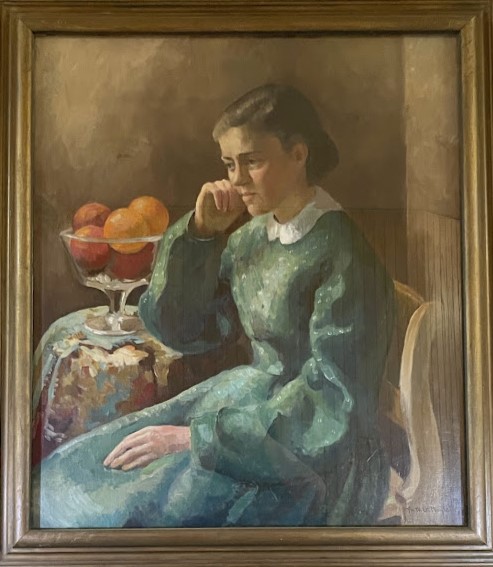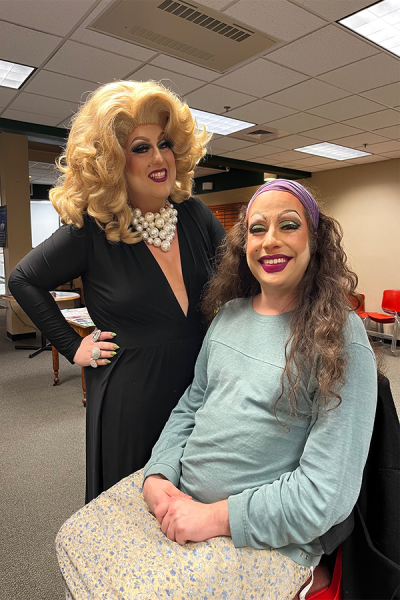Students expose the NSA, on-stage
Torture, murder, and suicide were brought to the Dibden stage Thursday, March 6, with JSC Alum and Burlington playwright Eric Hill’s one act, “Exposé in the NSA.”
Hill established his production company, Seeing Redd, upon graduating from Johnson State College in 2012, and has since produced and directed four plays, a full-length musical, and a theatrical adaptation of Jane Yolen’s novel “The Devil’s Arithmetic.”
“The interesting thing about Seeing Redd, is that we are trying to bring the workshop process and development theater out from behind closed doors,” said Hill. “We’re putting it in the hands of the people who matter, the student body.”
“Exposé in the NSA” debuted at the Champlain Mini-Makers Faire in September 2013, where it was directed by JSC Alum Liz Thompson, and has since been refined based on audience feedback from that performance. The one act will be further revised based on feedback from the JSC production, so that no showing will be exactly the same.
Unlike, say a play at the Flynn Theater, Hill encouraged the audience to use their smartphones to tweet feedback to #ExposeInTheNSA, but he couldn’t guarantee that the NSA wouldn’t be eavesdropping on the conversation and comments.
The play is about what goes on behind closed doors when the U.S. government perceives someone to be a threat to national security. It was short, but intense, and members of the audience gasped and then seemed to hold their breath each time the gun (firing blanks) was shot.
Hill portrays a fictional abduction of Edward Snowden and WikiLeaks Founder Julian Assange. The initial version also portrayed Kim Dotcom, but his quiet demeanor and character, in general, seemed out of place to the audience, so he was removed from the second showing.
This show, Hill says, developed from the feeling of resentment and anger toward the US government, after allegations that the NSA was eavesdropping on law-abiding Americans in the name of fighting terrorism. It prompts the question of whose security and freedom they are really trying to protect.
According to Hill, after the initial shock, people simply shrugged off the loss of the Bill of Rights and grew complacent.
The audience asked how much truth was behind the script, and Hill told them he tried to put as much truth behind it as possible, but he also has a lot of conjecture and opinion added in. Like, what if Assange and Snowden really are dead, and the U.S. government replaced them with body doubles?
Lights and sound were run by the Dibden crew, and Hill gave props to them after the show. Snowden and Assange were portrayed by JSC Theater Alumni Thomas Hunt and Lauren Chapman, who only had two weeks to learn the script and rehearse before performing.
“I researched Julien Assange to get a sense of his dialogue by watching interviews and looking online for information,” says Chapmen. “I even visited the WikiLeaks website to see what it was all about, so I’m probably on an NSA list now, or something.”
Hunt said he probably didn’t research his role as much as he should have, but they didn’t have much time, especially when all of the actors have other jobs, and were working different shifts.
Hunt and Chapman weren’t dead ringers for Snowden and Assange, and in fact, Assange was played by a woman, but Hill says that if they were dead-ringers, his play would be harder for the audience to believe.
Their black costumes were made to dehumanize each character by stripping away all of their color, which makes it easier for the audience to believe that these characters could be Snowden and Assange, but they could also be any body.
They were secured to chairs with corn-blue gaffer’s tape, electrocuted, and in a scene that was never rehearsed Snowden was water-boarded (which is actually legal in the US).
“I wasn’t expecting that much water. In practice we put the towel over my head and only poured a drop,” said Hunt. “I actually coughed some back up and had to swallow the rest. That was genuine fear.”
Assange and Snowden were eventually shot to death, and in a plot twist that developed from feedback after the first show, their captor, the nameless suit, shot himself as well. After reporting back to his contractors in the NSA he was told to commit suicide in order to tie up the last loose end, and control the flow of information.
“Exposé in the NSA” definitely makes people think about the abilities of the government, and what the NSA can and will do to keep their secrets quiet, which was exactly what the playwright intended. Who is the government really protecting; the American citizens or themselves? And who is calling all of the shots?
Hill said he will continue to perform “Exposé in the NSA” for anyone who expresses interest in seeing it, because “theater is the last bastion of freedom.”
Kayla served as a general assignment reporter and photographer for the spring 2013 semester. She returned for the Fall 2013 and spring 2014 semesters...








